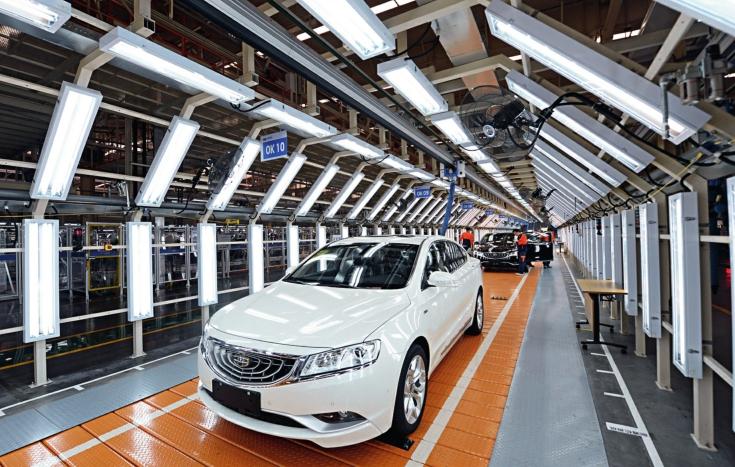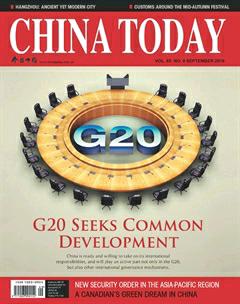City of Innovation and Entrepreneurship
By staff reporter CHEN JING
DURING the G20 Summit, the host city Hangzhou greeted both overseas and domestic visitors and participants with its high level of modernization, thriving art activities, and favorable environment for innovation and entrepreneurship.
Against the background of the Chinese government encouraging mass entrepreneurship and innovation, Hangzhou, capital of Zhejiang Province, has become a hub for entrepreneurs and achievers. Private businesses and e-commerce are booming here. In fact, Hangzhou was honored by the World Bank for having the best investment environment in China. It also appeared on the Forbes China list of Chinas best cities for business.
Fueled by Alibaba
Alibaba Group, one of the worlds largest e-commerce companies, has been growing along with Hangzhou City for as long as 15 years. “Our employees have the courage to think and act,” said Liu Lu, public relations manager at Alibaba Group. “We are willing to help any of our employees who have great ideas to accomplish their dreams. Alibaba offers its employees not only a job, but also an opportunity to start their own businesses.” Liu added that the development of Alibaba embodies the progress made by many young entrepreneurs and the growth of Hangzhou City.
The rise of Alibaba has helped to attract a large number of talents and form a complete industrial chain, laying down a foundation for the development of e-commerce in Hangzhou. The famous quote by Jack Ma, founder of Alibaba, that “everyone should have a dream” has exerted a far-reaching influence on Chinese society. Now “mass entrepreneurship” has been thriving in the Internet industry in Hangzhou, with batches of entrepreneurs having already achieved success.
So far, the city has become home to one third of e-commerce websites in China. Statistics show that in 2015 there were 262,300 active online retailers in Hangzhou, ranking it first in Zhejiang Province. According to the provincial commerce department, the value added by e-commerce in Hangzhou has hit RMB 82.654 billion, earning it a reputation as Chinas “e-commerce capital.”
Fueled by Alibaba, a complete and benign environment has been formed to facilitate a start-up boom in Hangzhou. Many business incubator zones have been established, such as Taobao Ecommerce Park, Tencent Start-up Base, Fudi Start-up Park, Dream Town, Yunxi Town, and Zhejiang University Science and Technology Park. Among them, the Dream Town established in 2014 aims to attract 10,000 college graduates within three years to start their own businesses and implement about 2,000 start-up projects. It also plans to set up at least 300 institutions for fund management and relevant affairs, with the scale of assets management hitting RMB 100 billion and total financial assets exceeding RMB 300 billion.
Jack Ma, executive chairman of Alibaba, has said on many public occasions that Alibaba is willing to provide a complete infrastructure for the development of e-commerce and any possible condition for new entrepreneurs. In 2015, he opened a non-profit institution – Hupan College (literally meaning Lakeside College) in Hangzhous West Lake scenic area, to provide lectures to those whose businesses are in the beginning stages or who want to start their own businesses from scratch. Many former Alibaba employees now constitute the main force of entrepreneurs in Hangzhou today.
Li Zhiguo was the first to resign from Alibaba and start his own business. Li established Koubei.com, a life-search engine providing living consumption information, in 2004. Later Alibaba invested in Koubei and holds an equity stake in the business. Then Li became an angel investor. He invested in Mogujie.com, a fashion-focused e-commerce service, whose founder is Chen Qi, also a former Alibaba employee. Li then invested in Kuaidi Car Hailing App, which bought another car hailing app, and the two together received strategic investment from Alibaba. Now Li has turned his attention to a new start-up by founding wacai.com, a personal finance and wealth management and financial products online platform.
By June 2016, there were 99 registered maker spaces in Hangzhou, home to 1,430 start-ups. Those maker spaces have been supported by 98 funds, with a total capital reaching RMB 7.2 billion.
Private Businesses Way to Innovation
Chinas auto market has long been dominated by foreign brand vehicles. But now it has entered a new development stage, with huge changes occurring in consumer demographics together with their demands.
People have an increasing appetite for individualized products that feature high technology and a reasonable priceperformance ratio. Liu Wen, a trainer with Geely Automobile Research Institute, told China Today: “Relying on its advantages in scientific research and development and technology innovation,Geely has made strategic adjustments to launch new brands such as Emgrand and Borui, not only occupying shares in the domestic market, but also winning overseas consumers.”
Now, with 13,000-odd patent applications and some 6,500 granted patents, among which over 2,300 applications are for inventions, 900 granted, Geely has been listed among the “Top 10 Brands of Independent Intellectual Property Innovation of Chinese Enterprises.”
In April 2016, Geely kicked off the new energy vehicle project in Hangzhou, with a planned investment of RMB 8 billion, the largest industrial investment project of the year in the city. A Geely spokesman said that this time the company decided to keep Hangzhou as the project location because of the citys benign entrepreneurship and innovation environment and great efforts to upgrade its economic structure.
In fact, the expansion of private businesses in Hangzhou is to a large extent driven by their capability of bringing in foreign cutting-edge technology and independent innovation.
Among the Top 500 Private Enterprises in 2015 unveiled by the All-China Federation of Industry and Commerce, 55 are in Hangzhou, ranking the city No.1 for the past consecutive 13 years in both the country and Zhejiang Province in terms of the number of enterprises on the list. Many private business giants such as Geely and Wahaha Group have all established their headquarters in Hangzhou.
The famous Chinese beverage producer Hangzhou Wahaha Group has blazed a trail with the introduction of new technologies and innovations. In the face of keen competition in the domestic market, Wahaha adheres to the“spirit of craftsmanship” and constantly adopts new technologies to produce individualized products and soft drinks with more taste, so as to better meet various consumers demands. In 2016 alone, Wahaha created a series of new brands such as Maoyuan coffee and Qili function drinks.
Start-up City
The local government has rolled out a series of support policies to boost private business and e-commerce in Hangzhou. Currently, nearly 100 business incubator zones and relevant service institutions have been established, including Xixi Fudi Business Incubator Zone, Hangzhou High-tech Industry Development Zone, Media Dream Works, and Hundsun Science and Technology Park.
“With a beautiful natural environment, a long history and rich culture and the ambience of inclusiveness, Hangzhou has attracted talents with dreams from all around the country. The city is a paradise for both entrepreneurs and investors,”said Wang Zhiqiang, head of the Bureau of Economic Development and Reform in Ganjiang District of Hangzhou.
In 2015 Hangzhou led the country in unveiling its policies on talents, which stipulated that a maximum subsidy of RMB 5 million will be granted to support high-level talents to launch their own businesses, a maximum subsidy of RMB 20 million to top start-up programs, and a maximum subsidy of RMB 100 million to key programs run by top-notch talents or teams.
Thanks to those policies, by the end of 2015 Hangzhou had attracted 1,034 talents, granted subsidies totaling RMB 140 million and provided funding to train 7,258 talents with high professional qualifications.
Fresh blood has made the city younger and more vigorous. Batches of Chinese enterprises have been founded and thrived here through independent innovation. Hangzhou, as one of the most energetic cities in China for innovation and mass entrepreneurship, is an ideal place for start-ups to grow and for talents to realize their dreams.

